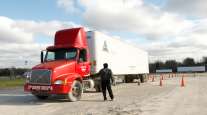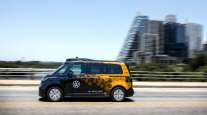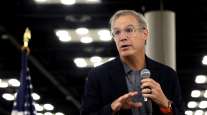Senior Reporter
Federal Policymakers to Draft Self-Driving Vehicles Bill

[Stay on top of transportation news: Get TTNews in your inbox.]
WASHINGTON — Policymakers in the U.S. House of Representatives are aiming to draft a bipartisan measure that would guarantee the deployment of lifesaving technologies in self-driving vehicles, the chairman of a key committee said Feb. 11.
However, as the current session of Congress winds down, transportation leaders have yet to proceed with comprehensive legislation meant to establish a federal regulatory framework for self-driving vehicles.
“We can bridge safety gaps by creating a national road map for self-driving cars. We should pass legislation that establishes safety standards and regulations for the gradual deployment of self-driving cars,” Rep. Frank Pallone (D-N.J.), chairman of the Energy and Commerce Committee, said during a hearing with stakeholders.
“The legislation should facilitate the collection and reporting of vital crash and incident data, and protect Americans’ rights to access the courts for the inevitable incidents related to self-driving cars. It should also promote consumer awareness and provide robust resources to federal regulators to oversee these complex technologies, while also preserving the appropriate role of state and local governments,” he added, noting his team has sought bicameral collaboration.
Rep. Greg Walden of Oregon, the top Republican on the committee, echoed the chairman’s call to action this year. He also noted the panel had advanced autonomous-vehicle policy legislation in the previous congressional session.
“Despite the work that was done then and the setback of coming up short, we are still here today talking about a need to pass an AV bill in the House. The U.S. is in a global race to AVs, but today the cost of inaction is clear: We are behind,” as he put it.
Autonomous Vehicles: Promises and Challenges of Evolving Automotive Technologies by Transport Topics on Scribd
An emphasis on safety was expressed in November by the top lawmaker on the policy in the Senate. Despite the insistence, no timeline for any specific self-driving vehicle measure has been established.
“As we continue to develop a regulatory framework, the discussion should also be driven by the potential benefits of [automated vehicles] to improve the country’s transportation systems,” Commerce Committee Chairman Roger Wicker (R-Miss.) said. “As technology continues to improve, AVs will be increasingly part of our daily lives. Therefore, it is up to us to ensure that the safety benefits of these vehicles are fully realized.”
Stakeholders, meanwhile, continue to press Congress to act. John Bozzella, CEO of the Alliance for Automotive Innovation, told the House panel Feb. 11 that Congress plays a role “to help provide the legislative and regulatory landscape that can enable the full safety, environmental, social and economic benefits of AVs.”
“Specifically, this committee has played a central role in improving motor vehicle safety and mobility,” he said. “Legislation can provide the clarity and structure needed to allow the safe testing and deployment to go forward with appropriate protections.”
“Federal and state governments have different roles in the deployment of [self-driving vehicles], and the expanding patchwork of local rules across the country will only delay [self-driving vehicle] testing and hinder America’s global leadership,” added Gary Shapiro, CEO of the Consumer Technology Association. “We need a ‘technology-neutral’ approach to SDV rules to allow new innovators to enter the SDV sector, develop safer technologies, and provide greater efficiencies.”
In part two of a two-part exploration of autonomous technology today, our latest RoadSigns podcast revisits conversations with Chuck Price of TuSimple and Ognen Stojanovski of Pronto.ai. Hear them discuss a palatable Level 2 version of trucking autonomy. Listen to a snippet above, and to hear the full episode, go to RoadSigns.TTNews.com.
National Transportation Safety Board officials have acknowledged the potential the technology presents to either mitigate or prevent crashes. They also insist on the need for regulatory uniformity.
“There has been an absence of safety regulations and federal guidance regarding how to adequately evaluate [automated driving systems], which has prompted some states to develop their own requirements for AV testing,” NTSB Chairman Robert Sumwalt told senators in November.
Various industry firms are testing the technology at the state level, and the National Highway Traffic Safety Administration created the Voluntary Safety Self-Assessment Index to archive the progress. Participating firms in the self-assessment include Apple, Aurora, AutoX, Ford, General Motors, Ike, Local Motors, Mercedes-Benz/Bosch L4-L5, Mercedes Benz L3, Navya, Nuro, Nvidia, Robomart, Starsky Robotics, TuSimple, Uber, Waymo and Zoox.
Want more news? Listen to today's daily briefing:





